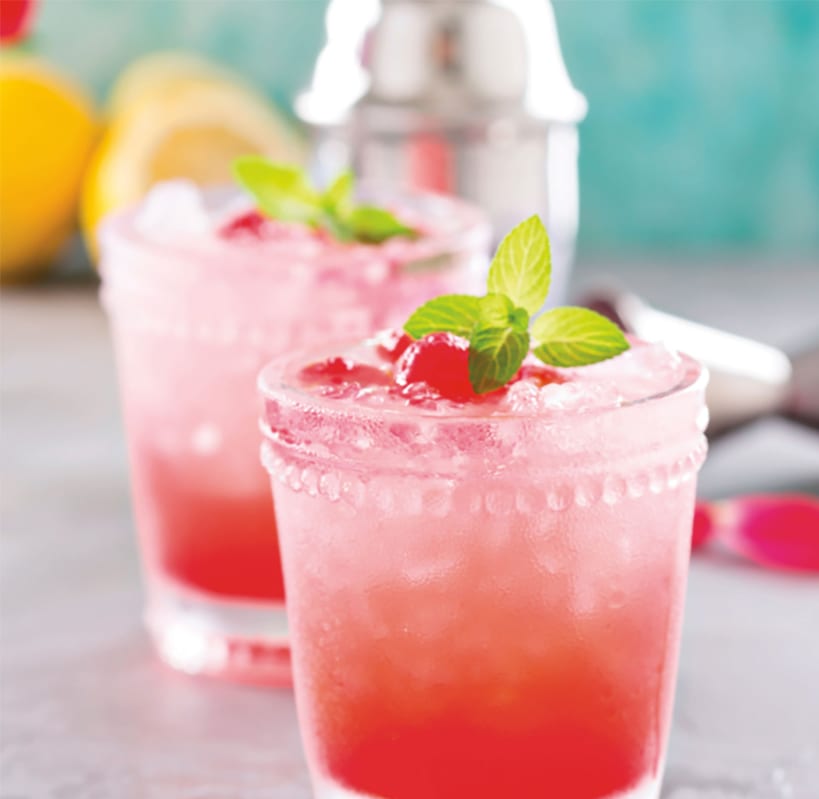BOOST
Beverage
BETTER FOR
you
PART 1: When is a beverage not just a beverage? When it’s boosted with extra nutrients.
By ANNE-MARIE RAMO, Contributing Editor
Photo courtesy of: Getty Images / simonkr
Today’s consumers are rarely satisfied with just a thirst-quenching drink when they crave a beverage. They’re seeking healthful extras that target everything from immunity to mood issues, from energy to meal replacement. And of course, they want plenty of flavor with few calories. The beverages that most appeal to these consumers boldly boast boosts that include vitamins and minerals, protein (plant or dairy), botanicals, tea, tea extracts, probiotics, prebiotics, and fiber.
Botanically enhanced drinks are among the leaders of the six-pack in sales. They are touting ingredients that modulate or stimulate immunity, or possess anti-inflammatory benefits. Ingredients in this category are too numerous to list, but the most popular ones of late are extracts or decoctions of ginger, echinacea, cayenne, cinnamon, eucalyptus, green tea, mint, and rosemary.

Floral botanicals, too, are in wide use, especially hibiscus, elderflower, rose, chamomile, jasmine, passionflower, and lavender. Hibiscus (a.k.a. jamaica) has been making a particularly strong comeback, having first experienced popularity in the 1970s and 1980s. Other trending botanicals are turmeric and ashwagandha (Withania somnifera). These are emerging across all flavor profiles, in both functional beverages and relaxation and hydration drinks.
Some of these botanicals, especially the florals, provide favorable flavor attributes and require minimal processing—often being employed as a concentrate from steeping and draining. But they are enjoyed for their calming and other effects as well. Those without the flavor advantages are often incorporated into more complex formulations that have a strong flavor profile or into a medium that masks any bitter or off notes.
Leaf and spore
While botanicals have been experiencing an upsurge in use in better-for-you (BFY) products, they can present a challenge in terms of flavor, as many are astringent or bitter. Hops (Humulus lupulus) have been moving beyond beers and ales and into other beverage formats. Echinacea is shifting from supplements into beverages due to its purported immunity-supporting activity, and turmeric is gaining popularity for its anti-inflammatory properties from curcumin. These ingredients typically require a strongly flavored medium and maskers or balancers in the formulation.
The right organic, high-intensity sweeteners can be a pivotal ingredient for many healthful beverage formulations. Photo courtesy of: Batory Foods, Inc.

Green tea, green tea extracts, and tea phytochemicals is a modern continuation of one of the most ancient healthy beverage traditions. Photo courtesy of: Taiyo America, Inc./iStock/KMNPhoto
Turmeric has won over some consumers by being incorporated into a dairy (or dairy analog) base as “golden milk.” The dairy base neutralizes the sharper flavor notes of this powerful ingredient, and it is often balanced with other spices, including turmeric’s botanical cousin, ginger. Somewhat new to the scene is umckaloabo, also known as the South African geranium (Pelargonium sidoides). It is an herb with a long history of warding off the common cold and treating symptoms of respiratory illnesses.
Available in both extract and powder forms, mushrooms play very well with the bold, earthy flavors of coffee, tea, and cocoa-based beverages, while enhancing the ability of these products to improve immunity, decrease stress, and increase resilience.
Not your grandma’s sleepy time
Popular botanicals for sleep and relaxation include chamomile (Matricaria recutita or Chamaemelum nobile), dandelion (Taraxacum officinale), lavender (Lavandula angustifolia), jasmine (Jasminum sambac), ginseng (Panax ginseng), ashwagandha (Withania somnifera), lemon balm (Melissa officinalis), passionflower (Passiflora incarnata), and hops (Humulus lupulus).
Up-and-coming botanicals that possess sleep benefits (and could already be considered GRAS based on their traditional use in food) include California poppy (Eschscholzia californica), jujube (Ziziphus jujuba), and linden. Also rising fast in the market for calming beverages are the cannabinoids, including cannabinol (CBN), the most sedating of the non-psychoactive cannabinoids.
While most of these herbs are available in powder and extract forms, care should be taken when selecting a CBN product. Aside from the fact that cannabis ingredients are not yet universally legal in the US, the technology used to extract, distill, or otherwise release these compounds from the plant is still evolving, and some products can be cost-prohibitive or inconsistent. However, the technology for water-dispersible cannabinoids has now been refined to an extent that it can offer beverage developers an easier way to infuse CBN into their drinks.

Mushrooms have long been touted as nutritional support ingredients because of their high levels of beta-glucan, as well as certain chemical compounds recognized as medicinal. Many clinical studies show that beta-glucans have strong immunomodulating effects. Mushrooms like lion’s mane (Hericium erinaceus), shiitake, and reishi (Ganoderma lingzhi) boost immune support and act as adaptogens.
Beauty-from-within beverages often include vitamin C and antioxidant carotenoids, such as astaxanthin. But relatively new to the category is extracts from the tremella mushroom (Tremella fuciformis). These extracts are believed to help skin retain moisture and to enhance collagen fibers that keep skin healthy and bouncy, making the mushroom a plant-based alternative to animal collagen. End of Part 1
One big trend in beverages has been adding nutraceuticals like superfruit extracts, antioxidants, and vitamins to alcohol beverages. Photo courtesy of: Talking Rain Beverage Co.
September 2021

